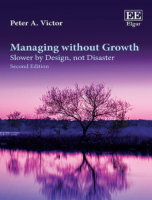 Slower by Design, not Disaster
Slower by Design, not Disaster
Ten years after the publication of the first edition of this influential book, the evidence is even stronger that human economies are overwhelming the regenerative capacity of the planet. This book explains why long-term economic growth is infeasible, and why, especially in advanced economies, it is also undesirable. Simulations based on real data show that managing without growth is a better alternative.
The opening chapters of this updated, revised, and expanded second edition Managing without Growth tell how the recent idea of economic growth emerged from the idea of progress, itself only a few hundred years old. There are many reasons for questioning growth as a key economic policy objective supported in the book based on extensive data as well as on conceptual and methodological considerations. Critical attention is given to the commodification of nature through monetization. ‘Natural’ capital captures the spirit of the times, but it can hardly be said to capture the spirit of nature.
The book continues with an exploration of possibilities for managing without growth in advanced economies. Three fifty-year scenarios are simulated with LowGrow SFC a new, on-line systems model with many novel features: 1) a base case in which trends and relationships continue, 2) an ambitious greenhouse gas reduction scenario, and 3) a sustainable prosperity scenario with broader environmental objectives as well as reduced income inequality, shorter working hours and the cessation of economic growth. In the closing chapter there is a discussion of policies that would help make sustainable prosperity a reality.


